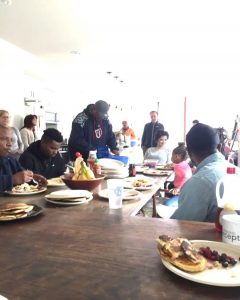I was doing the customary end of year decluttering, when I found myself flipping through a magazine with an article on the history of breakfast. It never occurred to me that breakfast would have a contentious history. According to this article, the breakfast meal has “long been the source of medical confusion, moral frustration, and political anxiety” (Garber 2016). At one point or another in history, breakfast has been shunned for being a temptation to commit the sin of gluttony, or an occasion for lavish social gatherings (in the 1800s when it experienced a revival). In our times, new research has cast doubt on the purported health benefits of breakfast (Carroll 2016; see also Anderson 2013).
Normally this type of article wouldn’t have caught my attention except that for the last couple of months, breakfast has been an important part of my endeavor to learn more about reentry in the District. Every month Changing Perceptions1, an organization dedicated to enabling returning citizens2 in the District to reach their full potential, hosts Pancake Saturday.
The site of Pancake Saturday is a very special row house on 18th Street in Southeast. I say special because this house serves as a home base for many returning citizens in the District, including those participating in the Aspire to Entrepreneurship program (see Valdovinos October 2017). Some returning citizens live here. For others, this house is the base for their small business, a safe space, a place to stop by for mentorship, or on certain Saturdays, the site of communal breakfast. Pancakes are usually the star of Pancake Saturdays but there are also eggs, bacon and sausage, sometimes waffles make an appearance, and on one occasion, the sweet potato hash from Reese’s Catering, even overshadowed the pancakes. Reese’s Catering is part of a growing network of small businesses owned by returning citizens in the District.
Just like breakfast, pancakes also have a long, albeit much less contentious, history. Pancakes are also ubiquitous throughout the world, known by various names and branded by levels of thinness or thickness. The idea of a “pancake day” is also anything but contemporary (Rupp 2014).
Pancake Saturday, however, is not just about breakfast or pancakes. It is also about building a healthy community and a positive social support network in line with the principles of the Aspire to Entrepreneurship program. Returning citizens in the District of Columbia face many challenges in reentry, some of which are unique to the District (see Valdovinos May 2017). Among the many challenges is securing traditional employment. As I arrived at Pancake Saturday this past October, I noticed that the Clean Decisions team3, another business owned and operated by returning citizens in the District, had gotten an early start on breakfast and the staff were on their way out, ready to start a full day’s work on a full stomach.
We have all heard the adage, at some point in our socialization that “breakfast is the most important meal of the day.” However, the latest research debunks this aphorism. After looking at the collective body of medical research on the health benefits of breakfast, Aaron Carroll, a journalist, has concluded that: there was “nothing magical about breakfast” (Carroll 2016). And yet, I wonder what a sociological body of research on the significance of breakfast, or meals in general, might suggest? The earliest sociological analysis of our gastronomic experiences I uncovered was Georg Simmel’s 1910 essay on the sociology of the meal.
The last Pancake Saturday event of 2017 was an occasion of delicious food, stimulating conversation, shop talk for returning citizen entrepreneurs, affirmations, reflections on the year ending, and wishes for the new year. And the weather was unseasonably balmy.
For this group, this repast event has become a site of learning and support, serving to reduce anxiety or frustration for many participants. I’ve never been much of a breakfast person myself, but the meal has become increasingly important thanks to Pancake Saturday. As a student/researcher working in reentry in the District for a year now, Pancake Saturday has provided me entry into ethnographic work, and as a resident of the DMV area, it has connected me to neighbors.
Notes
- To learn more about Changing Perceptions and Pancake Saturday, visit their Twitter page at https://twitter.com/changingdc?lang=en
- The use of “Returning Citizen” as opposed to “prisoner” is reflective of the use of “people first” language which aims to move past the use of dehumanizing and stigmatizing language such as “offenders”, “inmates”, or “convicts” when talking about people who have come into contact with the criminal justice system.
- To learn about Clean Decisions LLC, visit their Twitter page at https://twitter.com/CleanDecisions?lang=en
References
Anderson, Heather A. 2013. Breakfast: A History. Lanham, MD: Rowman & Littlefield.
Carroll, Aaron E. 2016. “Sorry, There’s Nothing Magical About Breakfast.” The New York Times, May 23. Retrieved (https://www.nytimes.com/2016/05/24/upshot/sorry-theres-nothing-magical-about-breakfast.html?_r=0)
Garber, Megan. 2016. “The Most Contentious Meal of the Day.” The Atlantic, June 19. Retrieved (https://www.theatlantic.com/entertainment/archive/2016/06/breakfast-the-most-contentious-meal-of-the-day/487220/)
Rupp, R. 2014. “Here’s the History of Pancakes.” National Geographic: The Plate Series, May 21. Retrieved (http://theplate.nationalgeographic.com/2014/05/21/hot-off-the-griddle-heres-the-history-of-pancakes/)
Valdovinos, Maria. 2017, May. “There is No Prison in Washington: Challenges of Reentry in the District.” The Sociologist, May 22. Retrieved (https://thesociologistdc.com/all-issues/there-is-no-prison-in-washington-challenges-of-reentry-in-the-district/)
Valdovinos, Maria. 2017, October. “Aspiring to Entrepreneurship in the District.” The Sociologist, October 10. Retrieved (https://thesociologistdc.com/all-issues/aspiring-to-entrepreneurship-in-the-district/).
By Maria Valdovinos

